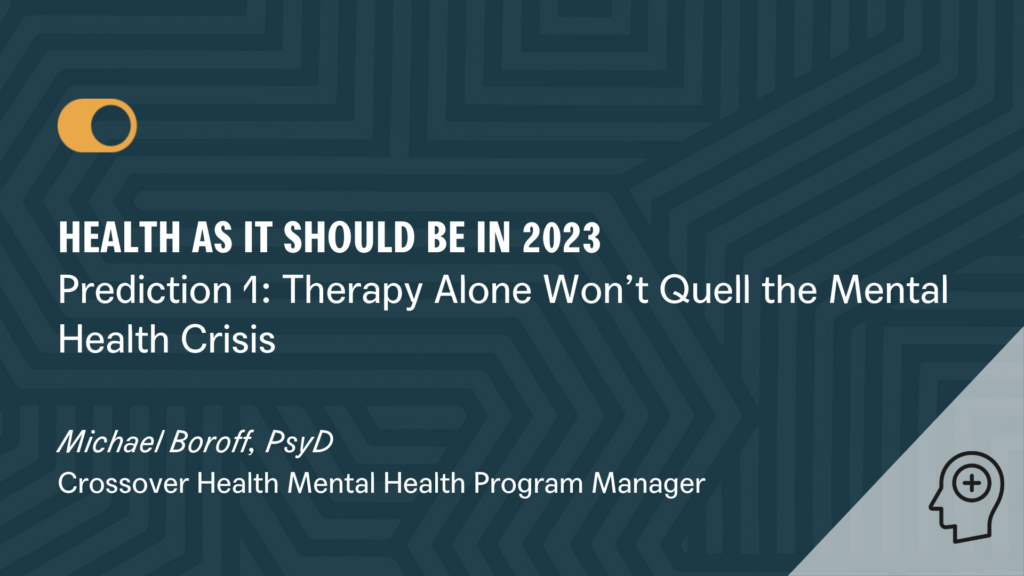
Blog
2023 Prediction 1: Therapy Alone Won’t Quell the Mental Health Crisis
Prediction 2 | Prediction 3 | Prediction 4
By Michael Boroff, PsyD
The demand for mental health services is up, way up. As a psychologist, I’ve seen incidence of mental illness surge during the pandemic—an environment primed for fostering feelings of loneliness, fear, and unmanageable stress—experienced amid coexisting societal hardships like racism, political extremism, and economic disparity. In a 2020 survey of more than 1.4 million U.S. adults, Boston College researchers report that Americans’ anxiety and depression prevalence rates soared to 50% and 44% respectively, rates six times higher than pre-pandemic norms. And now, confronted with these statistics, the healthcare system, in its current form, is failing to meet the therapy needs of patients with mental health conditions.
Beyond Provision of Access to Integrated Care
Despite a growing pool of mental health apps and point solutions that connect people with mental health services, we’re seeing a consistent failure to deliver the continuous, integrated care that outcomes-based, whole-person treatment requires. When we treat mental and physical health separately, failed access attempts and a lack of cohesion among care providers results, often yielding grave consequences for patients. Further, those most vulnerable often suffer in silence due to a general disconnectedness within the current system. We’ve made strides in solving for access, but improved mental health outcomes will only be achieved with integrated care delivery. It’s the value versus visits equation.
Validation is seen in member stories and their personal journeys. A middle-aged man in rural Texas had been suffering for years with anxiety, depression, substance abuse, and numerous physical ailments. When on his own with traditional care – in the existing fragmented healthcare model – he remained reluctant to seek therapy, having no established connection with a primary care provider (PCP) who may have supported his journey for help. But when provided access to Crossover, he ultimately got the treatment he needed once he was engaged with a physician who focused on his entire clinical history, on social determinants of health (SDOH), on environmental stressors, and mental wellbeing, collectively. As the member gained connection and trust in his healthcare community, he took a very important step away from ambivalence toward a therapy commitment to improve his relationships and life satisfaction. Today, he’s getting the treatment he needs from a team of committed providers who are invested in his total health and wellbeing.
Mental health integration into the primary care model has been shown to increase access to mental health treatment for rural residents, reduce the stigma associated with seeking these services, and maximize resources. Alternatively, separate physical and mental health systems can lead to fragmented care delivery, poor health outcomes, higher healthcare costs, and duplication of services. Solomé Tibebu, founder of Going Digital: Behavioral Health Tech, recently commented in Forbes about the availability of unique approaches to whole-person care. “Many companies are getting more sophisticated about how they integrate physical and behavioral health solutions. For so long, mental health has been left out of the mainstream healthcare system. But when we treat behavioral health issues in patients, there is a significant impact on overall physical health, too.”
As we approach 2023, there will be a drive toward integrated mental and physical care that is focused on wellness management of the whole patient. This will benefit not only patients and providers, but employers alike as they begin to move beyond basic access toward facilitating positive outcomes. With slim margins and intense competition across many industry sectors, employers will be invested in implementing strategies to encourage and maintain a healthy workforce. At Crossover, we’re seeing a growing number of clients obtain double digit utilization – some up to 20% – with members engaging in primary care, mental health and physical therapy to achieve optimal health.
An integrated paradigm will support frequent and meaningful discussions between providers and members about factors impacting health through means that are comfortable and convenient. Facilitating this trusted, reliable connection via in-person and virtual appointments will remedy traditional access issues, decreasing members’ risk for mental health crises and improving overall wellness. In addition to improving the patient experience, research shows that integrating mental health into primary care results in better access and improvements in health outcomes for patients.
A Team Approach and a Proactive Approach to Support Mental Health Management
By building on established care relationships with members, providers will address causes of chronic stress and trauma, discuss mental health essentials for wellness maintenance, and supply coping strategies for utilization during difficult times.
While this shift from access to integrated care is paramount, along with this we must also enable members to understand how they can help manage their conditions. Given the shortage of mental health providers to meet current demand, many patients are already seeking mental health treatment from their PCPs. In fact, as many as 70% of all primary care visits are driven by psychosocial factors. PCPs report feeling unprepared to manage patients’ mental health or substance use concerns, especially when severe. As the Commonwealth Fund asserts, integrated care equips PCPs and associated providers with effective tools for diagnosis and treatment. This is in line with the work we have begun at Crossover Health to reshape primary care visits, particularly annual exams.
We need to rely on a team of care professionals—including PCPs, therapists, psychiatrists, and health coaches—who are trained to help members identify factors that contribute to their mental health and guide them toward clarity of purpose and the choices that support it. As providers, we guide members to recommit to core values, engage in positive social interaction, identify signs of stress before it becomes unmanageable, and establish healthy coping mechanisms. Due to increased employment demands, it’s critical to help members establish appropriate home/work boundaries and convey the importance of maintaining reasonable workloads that leave room for self-care, exercise, hobbies, family time, and other personal priorities. We must also seek to understand and address exposure to unfavorable circumstances including racism, poverty, violence, environmental instability, and resource inequality, advocating for protective factors and community support in handling life’s most intense chronic stressors. Quality relationships, the primary drivers of change, enable these discussions that are vital to mental health management.
A Future Focused on Outcomes and Wellbeing
As we move to better integrate mental health care and primary care, we are reminded that large numbers of people with mental health needs also experience multiple chronic health conditions and use multiple medications. We simply cannot—and should not—separate mental and physical care. An integrated approach enables cross-discipline collaboration for establishing effective treatment plans. Clinical care navigators promote a proactive approach to care management, facilitate visit follow-through, and guide member execution of the care plan. This level of provider commitment empowers members to pursue and maintain their wellness instead of simply treating downstream symptoms.
In 2023 we will continue to see the most success for individual mental health when we embrace that we need more than access to additional visits. Tackling our mental health crises demands industry-wide recognition that whole-person treatment is only achievable through an integrated and accountable care delivery model, supported by a proactive wellbeing approach.
___
About the Author

Michael Boroff, Psy.D., is a clinical psychologist and the Mental Health Program Manager for Crossover Health. He oversees the mental health program across the country and works within Crossover’s integrated, team-based care model, to establish trusted relationships with his patients and their extended care teams to achieve optimal outcomes for his patients.